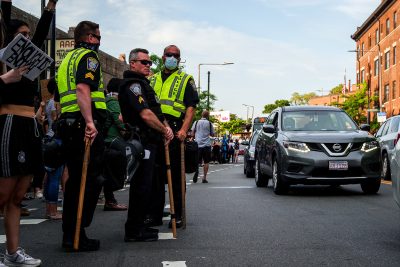The Boston Police Reform Task Force released Sept. 11 its initial recommendations for an overhaul of the Boston Police Department.

The report recommends creating an independent Office of Police Accountability and Transparency with subpoena power, expanding BPD’s diversity and inclusion efforts and increasing body camera usage.
It also suggests banning biometrics and facial recognition software, further specifying disciplinary measures under the BPD’s Use of Force policies as well as implementing new data and record practices.
The OPAT would replace the Civilian Ombudsman Oversight Panel, the current independent police oversight board, and act with stronger investigatory powers.
The report asks for implementation and internalization of their recommendations in a department environment that “prioritizes diversity, equity, and community engagement.”
It urges the City and BPD to view its recommendations as “the floor rather than the ceiling of police reform.” The Task Force was allotted approximately 60 days to create a comprehensive list to present to Mayor Marty Walsh, which the report stated was not enough time.
“The Task Force offers these recommendations not as an end all list of police reform recommendations, but as a foundation upon which additional work can be done,” the report stated. “To bring about meaningful reform to the BPD, reform that is internalized and put in to practice on a day-to-day basis, there is more work to be done.”
As part of the recommendations, the report requests the City pledge to implement its reforms without increasing the budget of the BPD.
The City’s resubmitted budget for the fiscal year 2021 allocates 20 percent of BPD’s overtime budget to equity and inclusion efforts.
“When it comes to police reform, Boston has been almost dead last,” Task Force member Jamarhl Crawford said.
Massachusetts has neither a stand-your-ground law — which permits individuals to use deadly force in self-defense — nor a process for police decertification.
Northeastern University professor Jack McDevitt, director of NEU’s Institute on Race and Justice, said changing the culture of police departments is a challenging but necessary step.
“One of the things that they call for [in the report] is changing the culture of police departments, and I think that is a very smart thing to try to do, obviously very difficult,” McDevitt said. “Calls for transparency and calls for reforming the culture are really important.”
During a speech at City Hall on Sept. 10, Walsh summarized the main points of the report and urged community members to read it and give their feedback as well.
“I am committed to taking action, to respond to those making your voices heard and to make Boston a more equitable city,” Walsh said. “This has always been about more than a moment. It’s about a process of change.”
Because of Walsh’s public stance on the issue, Crawford said he expects reforms in Boston.
“The mayor particularly made repeated statements that the intention is to implement the recommendations of the Task Force, some of which I think will be implemented immediately,” Crawford said. “Others may take a little bit more, from a legal standpoint.”
Walsh had signed a “Mayor’s Pledge” in June, issued by the Obama Foundation’s My Brother’s Keeper Alliance. He had in the same month also declared racism a public health crisis.
The 11-member task force was created in response to calls for reform to police departments not just in Boston, but across the country following a racial reckoning surrounding cases of police brutality.
The team consists of civil rights activists, legal professionals, clergy members as well as police officers of color.
Its main responsibility is to scrutinize the BPD and the City with a critical eye, “demanding institutional change to local law enforcement infrastructure,” according to the report.
The final draft of recommendations will be brought to the mayor after a community listening session on Tuesday, during which the public can voice their opinions on the report.




















































































































